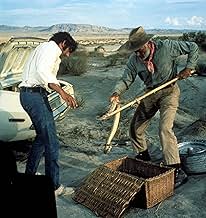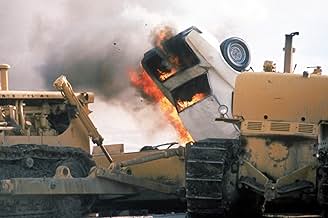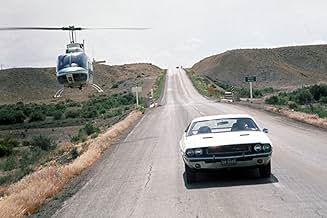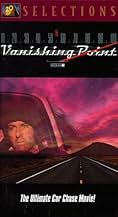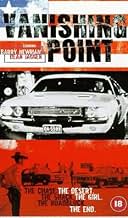CALIFICACIÓN DE IMDb
7.2/10
31 k
TU CALIFICACIÓN
Durante los 70, el repartidor de coches Kowalksi siempre hace el reparto en tiempo récord, a pesar de los problemas que esto le da con los de tráfico.Durante los 70, el repartidor de coches Kowalksi siempre hace el reparto en tiempo récord, a pesar de los problemas que esto le da con los de tráfico.Durante los 70, el repartidor de coches Kowalksi siempre hace el reparto en tiempo récord, a pesar de los problemas que esto le da con los de tráfico.
- Premios
- 1 nominación en total
Charlotte Rampling
- Hitch-Hiker
- (escenas eliminadas)
Robert Donner
- Deputy Collins
- (as Bob Donner)
- Dirección
- Guionistas
- Todo el elenco y el equipo
- Producción, taquilla y más en IMDbPro
Argumento
¿Sabías que…?
- TriviaThe car featured in the film is a 1970 Dodge Challenger R/T, with a 440 cubic-inch V-8, and not a 426 Hemi V-8 (as is often believed). Eight white Challengers loaned from the Chrysler Corporation were used during the filming.
- ErroresThe 19-inch racks in Super Soul's radio station with large tape reels (in one scene seen fast moving) are not audio equipment. These tape drives were used in computer systems in the 1970s to store data on tape.
- Citas
Super Soul: This radio station was named Kowalski, in honour of the last American hero to whom speed means freedom of the soul. The question is not when's he gonna stop, but who is gonna stop him.
- Créditos curiososThe Fox logo is shown without the fanfare making it one of the first times this has happened.
- Versiones alternativasWhen first released in Brazil, the movie had some scenes cut, reducing the running time to 99 minutes.
- Bandas sonorasYou Got to Believe
Composed by Delaney Bramlett
Sung by Delaney & Bonnie & Friends
(Courtesy of Atlantic Records)
Opinión destacada
Richard Sarafian's 1971 film "Vanishing Point" is, for starters, a fascinating study of those persons anthropologists sometimes term "marginal men"--individuals caught between two powerful and competing cultures, sharing some important aspects of both but not a true part of either, and, as such, remain tragically confined to an often-painful existential loneliness. Inhabiting a sort of twilight zone between "here" and "there," a sort of peculiar purgatory, these restless specters cannot find any peace or place, so they instead instinctively press madly on to some obscure and unknown destination, the relentless journey itself being the only reason and justification.
Disc jockey Super Soul (Cleavon Little) and delivery driver Kowalski (Barry Newman) are two of these specters, marginal but decent, intelligent men who can't or won't live in burgeoning competing cultures which in reality have offered them very little of worth or substance, despite their own personal sacrifices. Kowalski himself had tried to "fit in" with the Establishment as a soldier and police officer and later, attempted to do the same with the blossoming 1960s counterculture, but soon disappointingly found that they both were ridden with their own various forms of dishonesty and insincerity. Personal honor, self-reliance and genuine respect--Kowalski's stock in trade--were tragically valued very little by either, despite each one's shrill and haughty claims to the contrary.
Moreover, it's no accident Newman's character has a Polish surname; the Poles throughout their history have created a very rich and unique Slavic culture largely based upon just such a "marginality"--being geographically jammed between powerful historic enemies, Germany and Russia, and never being able to fully identify with either one, at often great cost to themselves. It's also no accident Little's character is blind and black, the only one of his kind in a small, all-Caucasian western desert town--his sightlessness enhancing his persuasiveness and his ability to read Kowalski's mind, the radio microphone his voice, his race being the focus of long simmering and later suddenly explosive disdain--all of the characteristics of a far-seeing prophet unjustly (but typically) dishonored in his own land.
The desert environment also plays a key role in cementing the personal relationship between and respective fates of these two men--to paraphrase British novelist J.G. Ballard, prophets throughout our history have emerged from deserts of some sort since deserts have, in a sense, exhausted their own futures (like Kowalski himself had already done) and thus are free of the concepts of time and existence as we have conventionally known them (as Super Soul instinctively knew, thus creating his own psychic link to the doomed driver.) Everything is somehow possible, and yet, somehow nothing is.
Finally, VP is also a "fin de siecle" story, a unique requiem for a quickly dying age- a now all-but-disappeared one of truly open roads, endless speed for the joy of speed's sake, of big, solid no-nonsense muscle cars, of taking radical chances, of living on the edge in a colorful world of endless possibility, seasoned with a large number and wide variety of all sorts of unusual characters, all of which had long made the USA a wonderful place--and sadly is no longer, having been supplanted by today's swarms of sadistic, military-weaponed cop-thugs, obsessive and intrusive safety freaks, soulless toll plazas, smug yuppie SUV drivers, tedious carbon-copy latte towns, and a childish craving for perfect, high-fuel-efficiency safety and security.
The just-issued DVD contains both the US and UK releases of the film; the UK release, I believe, is a much more satisfying film, as it has the original scenes deleted from the US version. As an aside, Super Soul's radio station call letters, KOW, are in fact the ones for a country & western station in San Diego.
Disc jockey Super Soul (Cleavon Little) and delivery driver Kowalski (Barry Newman) are two of these specters, marginal but decent, intelligent men who can't or won't live in burgeoning competing cultures which in reality have offered them very little of worth or substance, despite their own personal sacrifices. Kowalski himself had tried to "fit in" with the Establishment as a soldier and police officer and later, attempted to do the same with the blossoming 1960s counterculture, but soon disappointingly found that they both were ridden with their own various forms of dishonesty and insincerity. Personal honor, self-reliance and genuine respect--Kowalski's stock in trade--were tragically valued very little by either, despite each one's shrill and haughty claims to the contrary.
Moreover, it's no accident Newman's character has a Polish surname; the Poles throughout their history have created a very rich and unique Slavic culture largely based upon just such a "marginality"--being geographically jammed between powerful historic enemies, Germany and Russia, and never being able to fully identify with either one, at often great cost to themselves. It's also no accident Little's character is blind and black, the only one of his kind in a small, all-Caucasian western desert town--his sightlessness enhancing his persuasiveness and his ability to read Kowalski's mind, the radio microphone his voice, his race being the focus of long simmering and later suddenly explosive disdain--all of the characteristics of a far-seeing prophet unjustly (but typically) dishonored in his own land.
The desert environment also plays a key role in cementing the personal relationship between and respective fates of these two men--to paraphrase British novelist J.G. Ballard, prophets throughout our history have emerged from deserts of some sort since deserts have, in a sense, exhausted their own futures (like Kowalski himself had already done) and thus are free of the concepts of time and existence as we have conventionally known them (as Super Soul instinctively knew, thus creating his own psychic link to the doomed driver.) Everything is somehow possible, and yet, somehow nothing is.
Finally, VP is also a "fin de siecle" story, a unique requiem for a quickly dying age- a now all-but-disappeared one of truly open roads, endless speed for the joy of speed's sake, of big, solid no-nonsense muscle cars, of taking radical chances, of living on the edge in a colorful world of endless possibility, seasoned with a large number and wide variety of all sorts of unusual characters, all of which had long made the USA a wonderful place--and sadly is no longer, having been supplanted by today's swarms of sadistic, military-weaponed cop-thugs, obsessive and intrusive safety freaks, soulless toll plazas, smug yuppie SUV drivers, tedious carbon-copy latte towns, and a childish craving for perfect, high-fuel-efficiency safety and security.
The just-issued DVD contains both the US and UK releases of the film; the UK release, I believe, is a much more satisfying film, as it has the original scenes deleted from the US version. As an aside, Super Soul's radio station call letters, KOW, are in fact the ones for a country & western station in San Diego.
- AdamKey
- 20 feb 2004
- Enlace permanente
Selecciones populares
Inicia sesión para calificar y agrega a la lista de videos para obtener recomendaciones personalizadas
Detalles
Taquilla
- Presupuesto
- USD 1,585,000 (estimado)
- Total en EE. UU. y Canadá
- USD 12,442,673
- Total a nivel mundial
- USD 12,443,192
- Tiempo de ejecución1 hora 39 minutos
- Color
- Relación de aspecto
- 1.85 : 1
Contribuir a esta página
Sugiere una edición o agrega el contenido que falta

Principales brechas de datos
What was the official certification given to Carrera contra el destino (1971) in Mexico?
Responda

